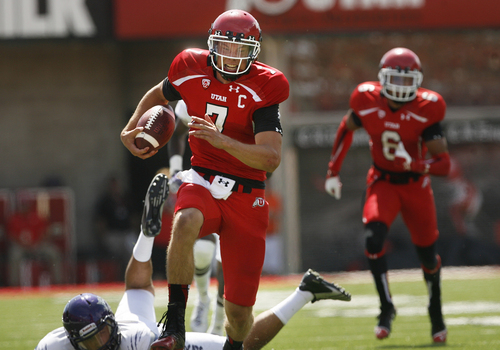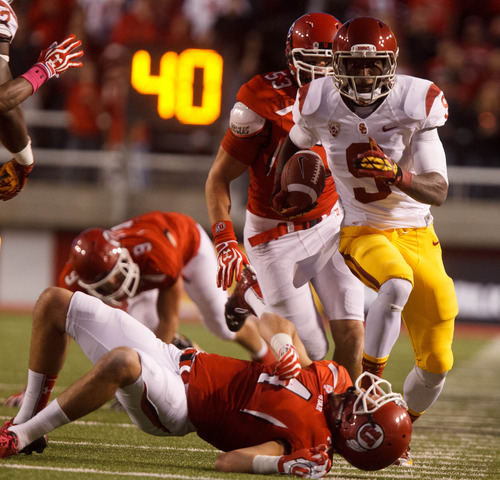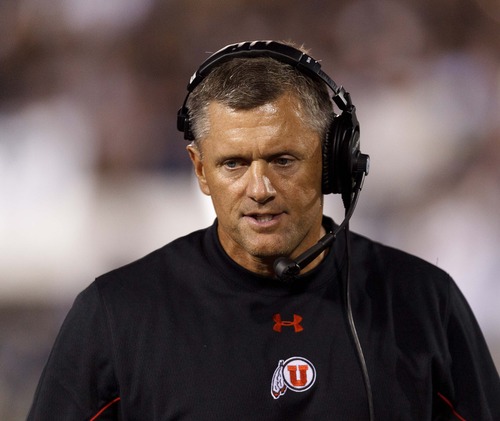This is an archived article that was published on sltrib.com in 2013, and information in the article may be outdated. It is provided only for personal research purposes and may not be reprinted.
Utah and USC don't face each other until Saturday, but the gamesmanship already has begun.
The Utes aren't divulging the details of Travis Wilson's hand injury, while USC says star receiver Marqise Lee is questionable for Saturday's contest.
The Utes aren't spending much time devising a what-if scenario for Lee's absence and are expecting the All-America candidate to play. The Trojans also are planning on seeing Wilson — especially after the sophomore quarterback pronounced himself fit to play following Tuesday's practice.
Just the same, enough uncertainty has been thrown into the mix for both teams that it throws a potential wrench into their game-planning. What if Lee doesn't play? What if Wilson plays a quarter and has to leave again? Is all this guessing necessary?
Coaches say they prepare for many scenarios, particularly if a player's health is in question, so they aren't surprised or unprepared for an opponent, making the need for formal injury updates rather meaningless.
But the thought of one team having a slight advantage over another by knowing the health status of players when the other doesn't isn't a welcome idea either. So to be safe, more and more coaches are clamping down on injury reports.
"Why put yourself at some sort of disadvantage?" Whittingham has said in explaining his injury policy.
So, ask the Utah coach about injured players such as Wilson, linebacker Jacoby Hale and others and Whittingham likely will just smile, reminding media members that such details are never discussed.
Whittingham hasn't always been so tight-lipped. In past seasons, he offered details on what injuries had occurred and what it meant for the upcoming game.
Two things changed his thinking. In recent seasons there were the incessant Jordan Wynn injury updates that grew controversial as Utah's coaches insisted Wynn was OK, when it was obvious from watching him throw he wasn't healthy.
Then, when the Utes joined the Pac-12, they were pitted against teams such as Oregon, UCLA, Washington and UCLA that declined to disclose injury information
The most public policy change came at USC when then-coach Lane Kiffin banned a reporter for reporting that the Trojans' kicker had undergone surgery and instituted a rule that if media members attended practice, they could not report on injuries.
Several newspapers, including the Los Angeles Times and Los Angeles Daily News, elected to not attend practice.
In the midst of the USC brouhaha, Whittingham adopted a similar stance, declaring that injuries were no longer to be a topic of discussion.
It is not always observed to the letter.
Whittingham was upset earlier this season when media outlets — including The Salt Lake Tribune — reported that kicker Andy Phillips was practicing with a brace on his knee in the days before Utah played Weber State. But the Ute coach fudged his own policy Tuesday when he told Pac-12 media members on a conference call that he was "optimistic" Wilson would play against the Trojans.
The irony? Whittingham would prefer it if the Pac-12 adopted an NFL-like policy in which teams release official injury reports that declare whether injured players are probable, questionable, doubtful or out for the upcoming game.
"It would be nice if they did do that and everyone adhered to the same format and the same way of announcements and releases of the injury report," Whittingham said. "But until then, we'll just continue not to have one."
Pac-12 commissioner Larry Scott said last season he would be open to adopting a standard injury reporting procedure for his league. However, there haven't been any further developments on the subject, leaving the league policy as is — which is to let schools decide their own standards for detailing injury reports.
Most Pac-12 coaches say they would welcome such standardization. Arizona and USC now release injury reports on Thursdays, in similar fashion to the NFL.
"It makes it easier for everybody concerned," Arizona coach Rich Rodriguez said of the weekly injury reports. "Realistically coaches are not qualified from a medical standpoint [to give more details] and a lot of things happen that come out of the course of week with a player making progress or not."
The only conference that has a formal injury policy is the ACC. Weekly injury reports are released on Thursday, following the NFL's style. Other leagues such as the Big Ten and SEC have discussed enacting similar standards but have yet to move forward. —
Injury reporting policies
NFL — All players with significant or noteworthy injuries are listed on daily and weekly reports
ACC — Schools report which players are having surgery or are out for the season. On Thursdays, schools must list injured players as out, doubtful, questionable or probable
Pac-12 — Allows schools to set their own policies
Utah — No details are given on injuries unless they are season-ending. Utah coach Kyle Whittingham is the only coach allowed to discuss injuries with media members. —
Utah at USC
O Saturday, 2 p.m.
TV • Pac-12 Network







